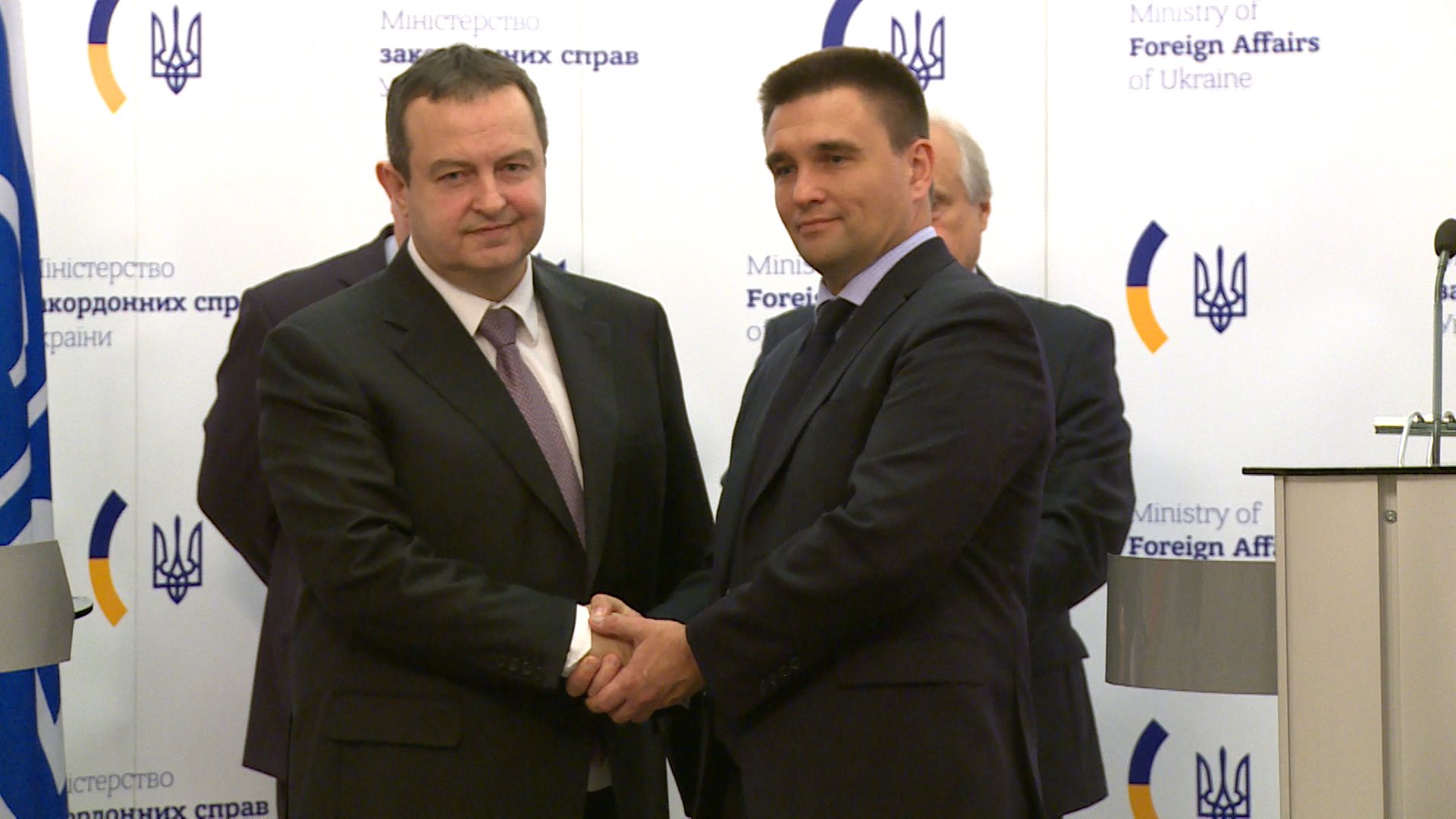



| Friday, 17 July 2015. | |
| OSCE Chairman‐in‐Office visits Ukraine | |
| + larger fontnormal font- Smaller font |
 First Deputy Prime Minister and Minister of Foreign Affairs of the Republic of Serbia Ivica Dacic is visiting today Kyiv, Ukraine, in his capacity as the OSCE Chairman‐in‐Office, where he had talks with Ukrainian Foreign Minister Pavlo Klimkin. First Deputy Prime Minister and Minister of Foreign Affairs of the Republic of Serbia Ivica Dacic is visiting today Kyiv, Ukraine, in his capacity as the OSCE Chairman‐in‐Office, where he had talks with Ukrainian Foreign Minister Pavlo Klimkin.The OSCE Chairman‐in‐Office also had talks with Chief Monitor of the OSCE Special Monitoring Mission (SMM) in Ukraine Ambassador Ertugrul Apakan, his Special Representative in Ukraine and in the Trilateral Contact Group Ambassador Martin Sajdik, and OSCE Project Co‐ordinator Ambassador Vaidotas Verba. “My friend Klimkin and I meet very often, and we maintain additional communication via telephone, with the wish that Serbia might make its contribution, to the largest extent possible, towards conflict resolution and progress making, in its capacity as the country holding the OSCE Chairmanship. Even though we have chiefly discussed the OSCE and its role in Ukraine, I would like to say that Serbia perceives Ukraine as a friendly country. The Ukrainian and Serbian people have had many things in common throughout history, and we would like to take our brotherly relations to a higher level. I am pleased that Mr. Klimkin visited Belgrade, and I would like to recall the recent telephone conversation between President Poroshenko and Serbian Prime Minister Vucic, where they expressed their shared wish to further enhance our relations. My today’s visit as the OSCE Chairman‐in‐Office aims to assist in conflict resolution and in achieving tangible progress on key dialogue issues. I am also authorized to convey the following messages on behalf of the Troika: the Minsk Agreements constitute an indivisible whole and all their provisions should be implemented. One cannot implement only one section of the agreements, the package must be implemented as a whole. We believe that weapons must fall silent, the truce and the ceasefire must be observed, we believe that heavy weapons should be withdrawn, and that the OSCE Special Monitoring Mission should have all verification means available. It is necessary that OSCE monitors have unrestricted access, and that their safety is fully respected. It is important to secure an agreement on the disengagement plan in certain hotspots, including Shyrokino. The political process needs to be accelerated, and the weapons must fall silent. By this we mean political agreements on the holding of local elections, and constitutional reforms. The constitutional reform should be directed at decentralization, with granting a certain status to the Donbas region. It is very important to have local elections organized on the basis of an agreement, with the participation of the OSCE, and ODIHR, and of course it is vital to alleviate the difficult humanitarian situation and the economic state. In this regard, I have decided to attend the next Trilateral Contact Group meeting on 21 July in Minsk. I would like to say that I appointed Austrian diplomat Martin Sajdik as my new Special Representative in the TCG, on 22 June. OSCE is the only international organization which can observe and verify the whole process in a credible manner. Hence, the OSCE stands ready to work on the establishment of a presence in those areas that require non‐stop monitoring. We aim to increase the number of monitors in the field. We believe that it is highly important to prevent any reverting to fighting in the coming period, and we support the work of the Normandy Format, the OSCE Mission and the TCG which actually puts into operation the decisions taken by the Normandy format. It is important that peace, stability and political dialogue be restored as soon as possible. I would like to say, since I am visiting at the time when the anniversary of the Malaysian airplane crash tragedy is being commemorated, that this tragedy reminds us of a very important task ‐ to contribute to the normalization of the situation in Ukraine. And it is precisely the Mission that plays the key role in resolution and access to the location where the plane’s debris lies scattered. We must not allow this to recur ever again. Once again, I hope that Martin Sajdik’s mandate will be short, for I hope that there will be no need for years‐long engagement, i.e. that we will make major headway in the implementation of the Minsk Agreements. Serbia stands ready to make its maximum efforts to facilitate conflict resolution and progress. I believe that the only way that guarantees us progress is to observe the Minsk Agreement. This means that all the parties to the Agreement should adhere to what they have signed, and implies parallel work on the implementation of all the provisions of the Minsk Agreement. We actually have two tasks ahead of us: one is status verification, and the other is helping with mediation and resolution of all contentious issues. This poses a huge challenge for our Organization, as my colleague has also stressed. I also hope that Ambassadors Apakan and Sajdik will have a lot of success in the coming period. I would like to add something else for the Ukrainian public to hear: The media frequently publish information that the Serbs are fighting on the side of Donetsk and Luhansk in Eastern Ukraine. I have to stress that Serbia prosecutes all persons fighting in an armed conflict anywhere in the world, including Ukraine. Everyone taking part in conflicts outside Serbia shall face imprisonment upon their return to Serbia”, OSCE Chairman‐in‐Office Dacic said. |